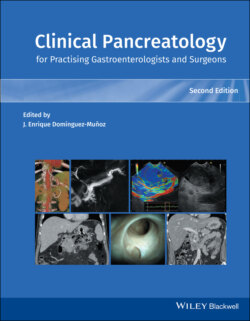Читать книгу Clinical Pancreatology for Practising Gastroenterologists and Surgeons - Группа авторов - Страница 63
Limitations of the Revised Atlanta Classification
ОглавлениеWhile studies have validated the RAC as being a superior classification system compared to the original AC, limitations exist [1,2,4,6]. Notably, the RAC does not differentiate between several characteristics of organ failure that have been shown to impact outcomes.
First, persistent multisystem organ failure has far greater mortality compared to persistent single‐system organ failure [4,24,26]. Second, a higher grade of persistent organ failure (e.g. modified Marshall grade 3 or 4 requiring respiratory ventilation) is associated with worse outcomes [27]. Additional factors which may influence outcomes, such as timing (early versus late onset) of persistent organ failure, duration of persistent organ failure, and organ system affected (cardiovascular versus renal versus respiratory), require clarification[24,25,27,28].
Several additional factors that impact mortality in AP are not addressed by the RAC. First, compared to subsequent episodes, the initial episode of AP may follow a more severe course and accounts for nearly 100% of the mortality [29]. Second, AP patients requiring hospital transfer have higher rates of multisystem organ failure, need for intensive care, and mortality [30]. Third, mortality in necrotizing pancreatitis affecting only the peripancreatic tissue is lower compared to cases affecting both pancreatic and peripancreatic tissue (8–9% vs. 20%) [23].
